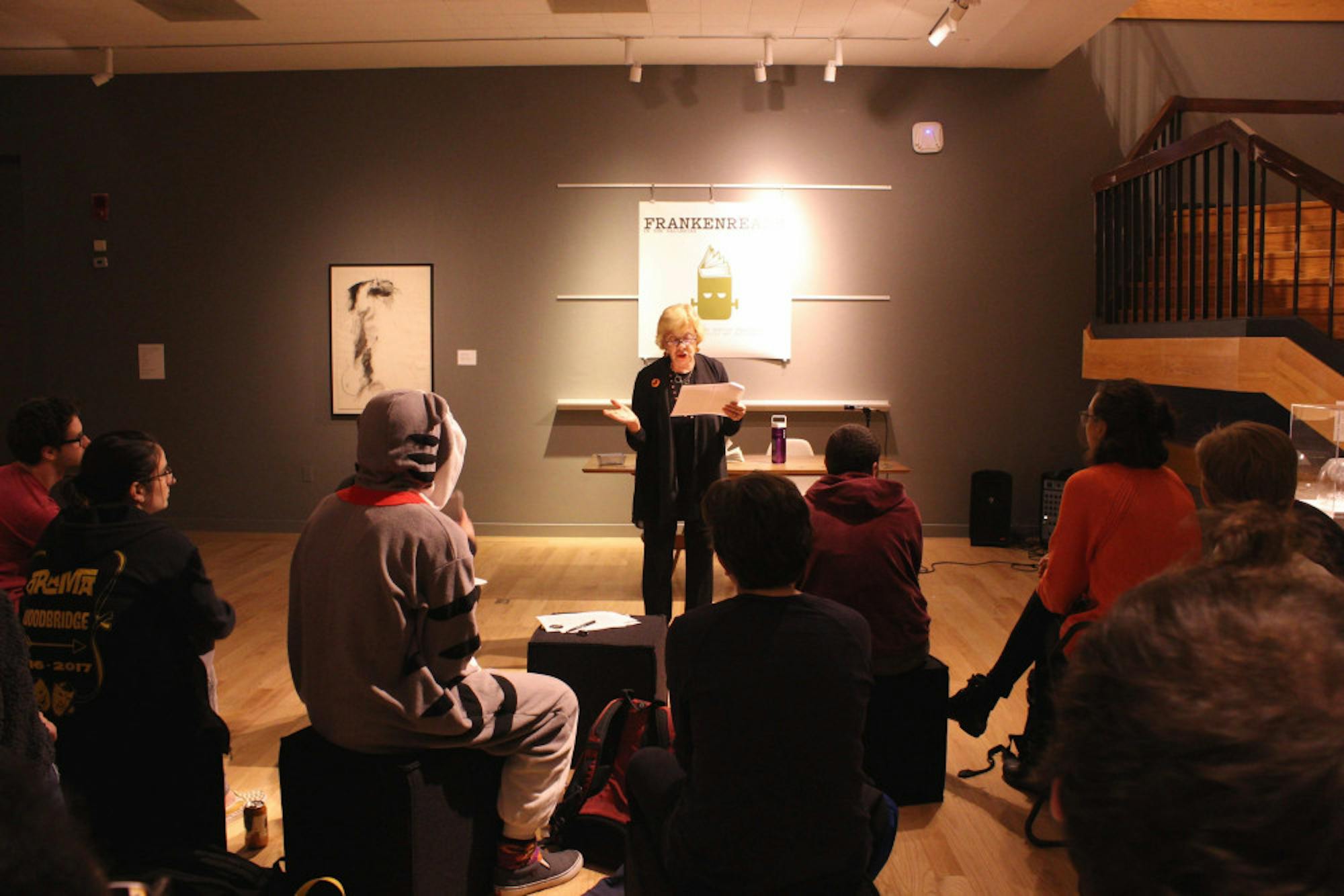The Department of English and Tufts University Art Galleries (TUAG) co-hosted a full day, marathon reading of the entirety of Mary Shelley's "Frankenstein" (1818)in the Tisch Family Gallery this Halloween.
The event was a part of the international "Frankenreads" reading festival, put on by the Keats-Shelley Association of America to honor the book's 200th anniversary,according to the Frankenreads website. Tufts' iteration of the event was organized by Associate Professor of English Sonia Hofkosh.
Billed as a "community marathon reading," Tufts' Frankenreads was open to all members of the Tufts community interested reading a small section of the novel. Starting at 10:30 a.m. and going until the end, readers took turns reciting aloud the novel before the attendees.
Hofkosh said that her motivation for bringing Frankenreads to Tufts was to offer the Tufts community a space to celebrate the novel.
“I wanted Tufts to be part of this wide celebration which brings various people around the world together around a literary text," she said. "I saw it as an excellent opportunity to bring members of the Tufts community together in recognition of this remarkable novel, written by a very young woman in 1818, which then and still now addresses some of most complex and pressing questions there are about what or who gets defined as human.”
Hofkosh added that the book is an important reading in her own teaching, and that Mary Shelley is an important figure in her own scholarship as well.
Jess Keiser, an assistant professor of English, told the Daily in an interview that Hofkosh is one of the leading figures in Shelley research. Keiser also participated in the reading: At about 5:45 p.m., he read a pivotal moment of the novel in which Victor Frankenstein kills the monster's female companion.
Keiser said that Frankenreads made "Frankenstein" into a new experience.
"It's a book that I've read many times. I've taught it many times. But hearing it out loud, read by many people, I was just sort of captivated, riveted, and I couldn't leave until I found out what happened, even though I knew exactly what happened," Keiser said.
Hofkosh also noted that reading the text out loud contributed to her understanding of the text, which she has read many times in the past.
“There were readers and audience members [at Frankenreads] who had not read the book before and who were surprised by how complex the character of the creature is and how moving the story is, but even I, who have read the book multiple times, heard things in it yesterday that I have failed to register in past readings.”
Many of the readers throughout the day were Hofkosh's students. Tufts staff, faculty, alumni and community members were also invited to fill reading blocks from 1–3 p.m. and from 6–9 p.m.
According to Hofkosh, readers included Dean of the School of Arts and Sciences James Glaser and Dean of Academic Affairs Joseph Auner, as well as various faculty members. Several local community members also volunteered to read.
Laura Ferguson, senior writer and editor in the Tufts' Office of Communications and Marketing, said she had a positive experience at the event.
"It was energizing in so many ways -- we talked on the way back how refreshing it is to read aloud," she said. "[The reading] reminded us all that literature matters."
The reading took place in the Tisch Family Gallery in Aidekman Arts Center, as a part of a partnership with Liz Canter, TUAG's gallery academic program manger. The gallery currently features “States of Freedom: The Figure in Flux," an exhibition described by the gallery as “addressing the impossibility of representing the human subject in total.”
The exhibition, which took the bicentennial of "Frankenstein" into consideration, focuses on human "form," according to a Sept. 14 Daily review of the exhibition. According to Hofkosh, the gallery venue was particularly relevant to "Frankenstein," a book about a creature who gets pieced together out of disparate body parts.
Over the course of the day, readers and audience members came and went, taking in the classic novel, a story of failed humanity, on Halloween.
The bicentennial celebration of Frankenstein does not end on Halloween, however. According to Hofkosh, the commemoration continues at Tufts with a screening of an experimental film about the writing of "Frankenstein" and discussion with the filmmaker Abigail Child on Nov. 29 at 6 p.m. in Tisch Library.
Daniel Nelson contributed reporting to this article.






